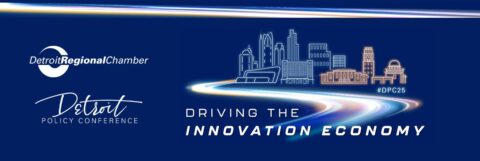Bridge Detroit
Jan. 22, 2025
Kayleigh Lickliter
Each year, the Detroit Regional Chamber brings together policymakers and business and civic leaders from across the region to discuss ideas, visions, and the future of the City of Detroit.
Detroit Mayor Mike Duggan has traditionally taken the stage during May’s Mackinac Policy Conference with a specific proposal that policymakers and leaders in the business and philanthropic communities can support. Meanwhile, at the Detroit Policy Conference, city leaders discuss accomplishments, progress, key objectives and a path forward.
Each year the Chamber sets a theme that guides the conversation throughout the conference. This year’s theme is “Driving the Innovation Economy” and according to the Detroit Regional Chamber’s website, “Speakers will discuss creating an environment to attract and grow startups, high-tech companies, investment, and talent – all while highlighting the way forward in building a dynamic innovation economy.”
This year’s conference will kick off Thursday with a conversation about the elephant in the room: redeveloping the Renaissance Center, followed by conversations with leaders in technology, the automotive industry and economic development in Detroit.
Duggan is scheduled to take the stage at 4:06 pm, followed by a panel of Detroit City Councilmembers at 4:45 pm. A full schedule is available on the Detroit Regional Chamber’s website.
A lot has changed since the 2016 conference when the focus was on Detroit’s neighborhoods and barriers to the city’s revitalization including education, blight, regional transit, and public safety.
Technology wasn’t among the issues for business and civic leaders when they discussed a vision for “Detroit 2030” at the 2019 conference. In fact, the idea of Detroit becoming a “tech hub” didn’t start to take shape, at least not publicly, until the last couple of years.
During the 2023 Detroit Policy Conference, Duggan said that people initially told him Detroit “should come back as a biosciences center” but he didn’t believe the city was in a position to compete with Boston. He did, however, believe Detroit was set up to become a “tech center” and looked at opportunities for the city to compete with other major U.S. cities, such as Silicon Valley.
“We’re winning competitions we wouldn’t have even thought of entering five years ago,” Duggan said during the 2023 conference.
When he initially explored the idea of Detroit as a leader in technology and innovation, Duggan said he started with the Big Three automakers and their manufacturers and suppliers. Eventually, Duggan said Ford Motor Co. Chairman Bill Ford brought the plan for electric and automated vehicles at the renovated Michigan Central Station building, which attracted other automotive technology companies. “Cars are becoming, more and more every year, computers on wheels and so a lot of tech-related companies started to come,” he said.
Attracting and retaining talent
Aside from the more obvious benchmarks that highlight a city’s economic potential, Detroit’s ability to attract and retain talent has been a consistent underlying theme over the last decade.
The Chamber and MichAuto presented findings from McKinsey & Co.’s 2024 survey on Black tech talent in metro Detroit in October, which found that 45% of STEM graduates in Michigan leave the state for technology centers in other major cities. Although the state produces more STEM graduates than the national average, Black talent only represents 11% of all tech roles.
A panel of leaders in Detroit’s tech industry discussed the survey findings and strategies for the future including incorporating algebra and computer sciences in the classroom curriculum, introducing STEM “playgrounds” at a younger age, and employers providing funding so employees can obtain a postsecondary degree.
The city’s urban environment, affordable housing, lack of traffic, downtown amenities and other aspects not only attract tech-related companies but also attract young people who want to live in a city like Detroit, the leaders said. For many large companies, these circumstances and the ability to create talent pipelines are attractive when deciding where to invest.
Attracting companies to the city isn’t a new challenge for Detroit. Duggan’s strategy for bringing manufacturing back to the U.S. from Mexico, and to Detroit specifically, was on full display during the 2015 policy conference.
Duggan said his first test as mayor was convincing the U.S. Navy, University of Michigan, and Ohio State University to consider Detroit when they were looking for a location to open a Lightweight Metal Manufacturing Institute where the latest research would inform the production of lightweight metal that would be used in airplane, ships, and cars.
In 2023, Duggan said that Amazon wanted to build its second headquarters where the top students in the country lived. He also discussed Stephen Ross’ idea to build a world-class graduate school in downtown Detroit and funding startup companies like they do in Silicon Valley to create a direct pipeline into innovation and tech-related careers.

